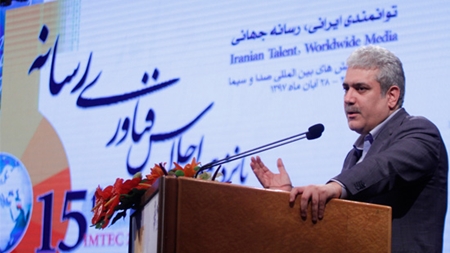Sattari Expressed on the Opening Ceremony of the 15th Media Technology Summit:
Wealth creation by Iranian savings and innovation in the creative and cultural industries
Wealth creation by Iranian savings and innovation in the creative and cultural industries

According to the public relations and information center of the Vice-Presidency for science and technology affairs, Sorena Sattari, the vice president for science and technology affairs, pointed out the highlighted role of knowledge-based companies and startups in soft and cultural industries, especially the media, on the opening ceremony of the 15th media technology summit, affirming: the creative abilities of knowledge-based companies and startups show that the role of knowledge-based and technological businesses has increased in hardware and software media. However, this ability has been nurtured in the software media more than before by relying on the innovation of creative and academic youth.
The Paved Path of Flourishing of Soft and Cultural Industries
The vice president for science and technology affairs pointed out the capacity of graduated Iranian human resources in line with advanced countries of the world, students of the field of humanities are regarded as a capacity for development of soft and cultural technologies to technologies in the media field, adding: the capacity of humanities is recognized as the most important intellectual and software infrastructure and must solve problems with creative and efficient solutions. The most important factor for production of cultural contents and having a high-level media in a country is paying attention to innovation and investment of the private sector in the area of humanities, as well as soft and cultural industries.
The president of the soft and identity-making technologies development headquarter emphasized the increased role of investment of the private sector in the area of cultural industries and humanities through creating a suitable environment, continuing: the capacity of the private sector must be injected into the school of innovation and entrepreneurship. In this regard, the presence and tendency of the private sector for investment in fields of knowledge-based, creative, and startups, will be realized by laying the foundation for establishment of a business environment and culture-building of actual value of investment in these fields.
The vice president for science and technology affairs regarded the wealth creation in the field of soft and cultural technologies and turning these capacities into soft power to be relying on culture building in this field, asserting: the presence of innovative business from one hand, and laying the foundation for investment of the private sector from other hand can pave the way for turning the capacity of the country in the field of cultural industries into soft power.
According to Sattari, the most important concern regarding the insignificant role of research in flourishing of industries is lack of localization of academic outlines from one hand and the industry from the other hand. In this respect, he pointed out: over the past few years, universities have been established based on a western model. One of the most important problems of this issue is the inefficiency of universities in helping local and powerful industries of the country, such as cultural and handicrafts industries. However, the handicrafts industry has continued its way based on local cultural features and rich history of the country despite all problems.
He also marked: in order to have a dynamic, efficient, and competitive industry, we must be able to commercialize our optimally designed ideas since it is the industry that can lay the foundation for presenting new creative products.
Presence of the Private Sector in the Ecosystem
The president of the national elites foundation explained about solving problems by investing in research area, adding: the major part of heavy costs in the research field have no significant role in solving the problems of the country. Therefore, the cultural and intellectual foundations of research costs must be modified instead of creating research centers to invest in the creativity of efficient researchers.
Sattari regarded innovation in businesses as the most important factor for success of knowledge-based companies, expressing: by injecting money into the research or business fields, occupations will not be formed. Therefore, innovation is the most important component of knowledge-based businesses.
The 15th Media technology summit was opened in the presence of Hojatoleslam val Moslemin Mousavi Moghadam, the vice president of national media, Reza Alidadi, deputy for technology development, Hamid Shahabadi, deputy speaker of IRIB, Mohammad Sahebkar Khorasani, head of affairs of knowledge-based institutes and companies, and a number of foreign guests and media authorities.
In this event, 80 knowledge-based companies and 40 new businesses (startups) presented their achievements.
One of the goals of this summit was exploiting the local achievements of knowledge-based businesses in the field of media.

comment